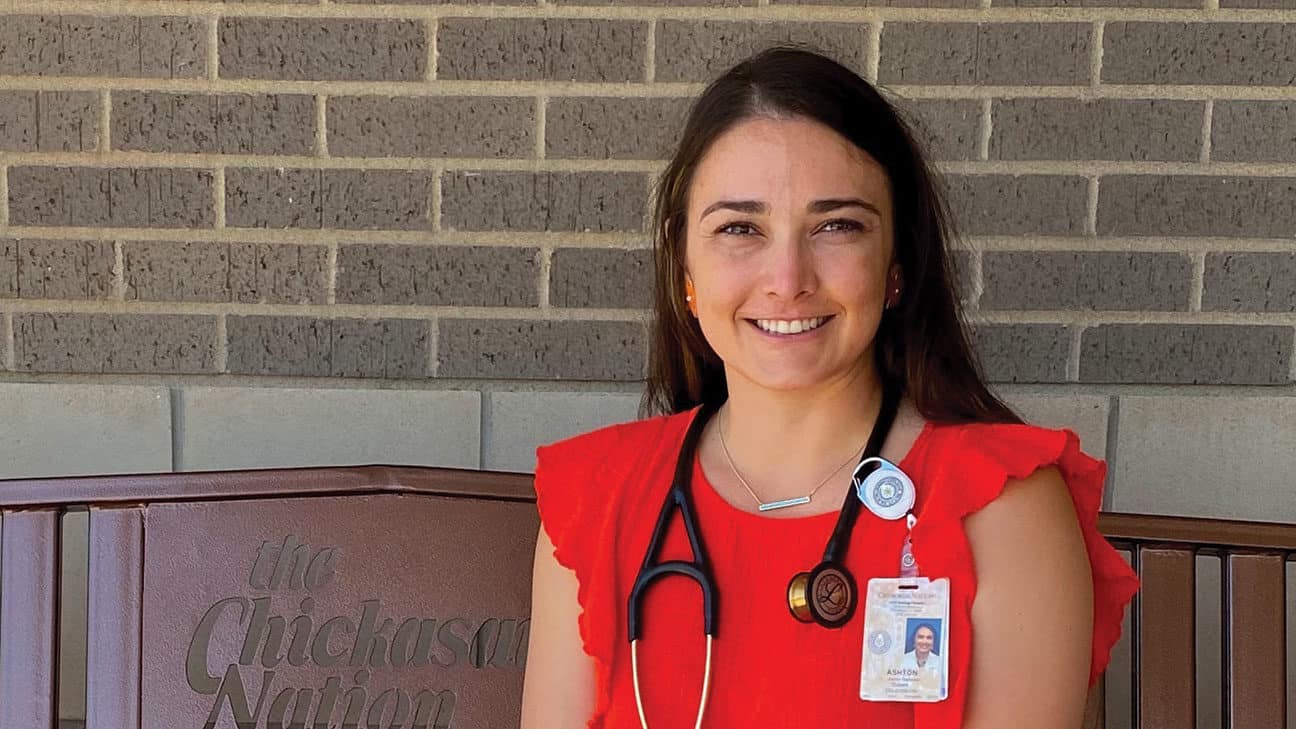
Medical student Ashton Gatewood
Medical School Provides Tribal Training Opportunity
Published July 1, 2021Medical student, Ashton Gatewood gained more than patient care skills and clinical knowledge during her Summer Tribal Externship at the Chickasaw Nation Purcell Health Clinic. During the two-week program, Gatewood said that she learned the importance of forming meaningful physician-patient relationships to facilitate lifelong health and wellness for both patients and their physicians.
At the Purcell Health Clinic, Gatewood worked with Dr. Beth May, D.O., an emergency medicine physician practicing in the primary care clinic. “Being back in the tribal community reminded me of the purpose behind all the challenging schoolwork, and Dr. May has provided a role model to strive towards becoming like as a future physician,” said Gatewood.
Gatewood is a medical student in the inaugural class of 2024 at the OSU College of Osteopathic Medicine at the Cherokee Nation. She is a tribally enrolled member of the Choctaw Nation of Oklahoma and descent of the Chickasaw Nation of Oklahoma.
“I was excited to work with an osteopathic physician in the tribal setting, and Dr. May exemplifies implementing the osteopathic tenets in her daily practice. She considers her patients’ work environment, family situations, diet, and exercise when forming treatment plans, and works with patients to achieve results that are meaningful to them.” While at the Purcell Health Clinic, she was able to observe physical therapy, optometry, and case managers working together to provide patients optimal healthcare interventions through all the resources available. “I’m continuously impressed at how much our tribal leaders have invested in healthcare, especially in rural settings,” said Gatewood.
Gatewood is no stranger to small towns. She graduated from Mustang High School and grew up visiting her parents’ families in Marlow, Oklahoma and Neosho, Missouri. Before going into medicine, she worked in several healthcare roles within Indian Health Services (IHS), including pharmacy technician, public health nurse, and healthcare administrator.
“I’ve been passionate about improving the health and wellness of tribal members throughout my professional career. So, getting this opportunity to apply knowledge gained through the coursework by working among health care providers and patients within my own community has been a rejuvenating experience,” she said.
“I benefited from mentorship, financial support, and professional opportunities from my tribes’ programs and tribal community leaders; therefore, I feel the responsibility of my position as a future American Indian physician to give back to the community whose investments have carried me to where I am today,” she said.
Gatewood will begin her second year in medical school during the upcoming school year. She is a National Health Services Corp Scholar and plans to return to IHS to work as a primary care physician upon completion of her training in osteopathic medicine.
About the Organization
Oklahoma State University Center for Health Sciences and the Cherokee Nation have established the nation’s first tribally affiliated college of medicine in Tahlequah, Oklahoma, which opened in August 2020 with an entering class of 54 first year medical students. The OSUCOM-CN is an extension of the OSU College of Osteopathic Medicine located in Tulsa. OSU College of Osteopathic Medicine is accredited by the American Osteopathic Association’s Commission on Osteopathic College Accreditation.
About the Program
The OSUCOM-CN Tribal Medicine Track and the Summer Tribal Externship Program prepare students to be highly qualified future physicians within Indian Health Services, through cultural and language coursework along with clinical rotations at federal, tribal, or urban IHS facilities.